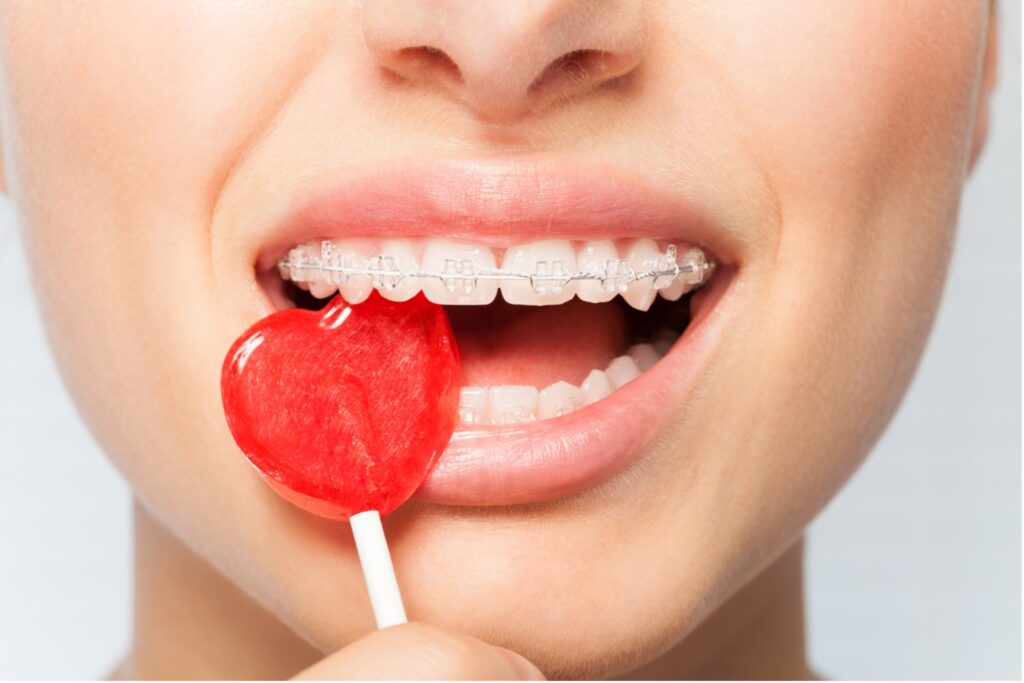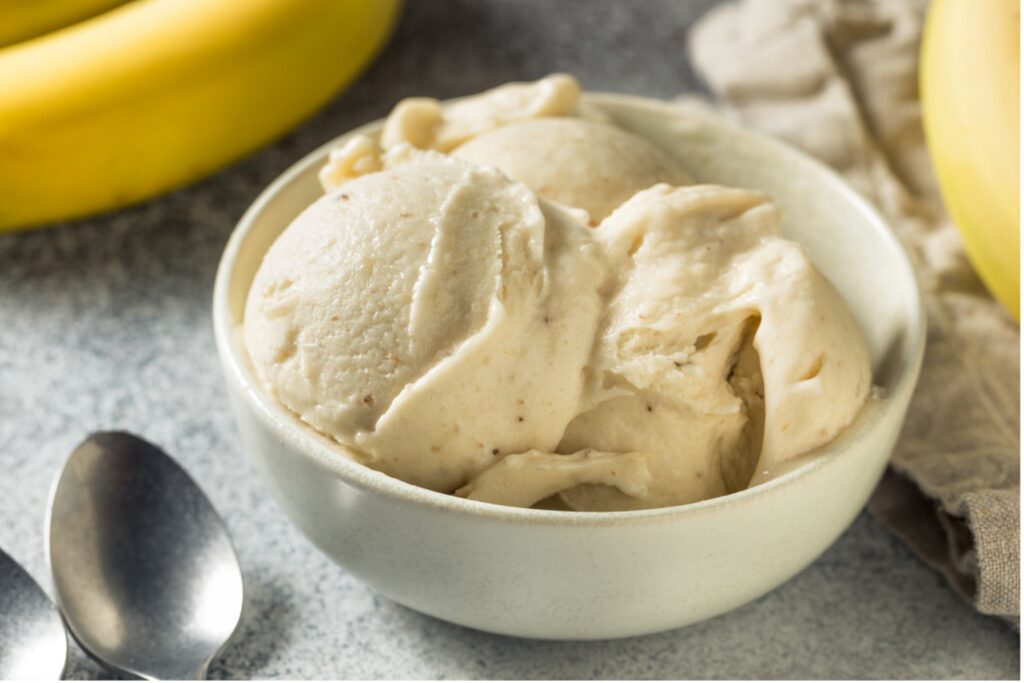
Are you into sweets and treats but currently have braces? Brace yourself for a reality check: sugar can have a not-so-great impact on your braces and dental health. In this article, we’ll talk about how sugar affects your braces and teeth.
To keep your braces in good shape and ensure your journey to a straighter smile goes smoothly, it’s important to be careful about how much sugar you eat. In this blog, we’ll get into the specific ways sugar can affect your braces and give you some practical tips to minimize the problems.
So, if you love sweets and have braces, keep reading to find out the not-so-sweet side of sugar and how to keep your smile looking great during your orthodontic treatment. And don’t miss the sweet no added sugar recipes at the end!
The Scoop on Sugar and Your Teeth
Sugar is like the mastermind behind tooth decay, also known as dental caries. When we munch on sugary stuff, the bacteria in our mouths snack on the sugars and make acids. These acids wear away tooth enamel, the protective layer of our teeth, causing demineralization and those nasty cavities.
Sugar also affects the important job saliva has in preventing tooth decay. Saliva helps to wash away food particles and it neutralizes acids in the mouth. But when we overload on sugar, saliva can’t do its job well and you wind up with the perfect playground for bacteria to multiply and cause tooth decay.
Cutting back on sugar and keeping up with good oral hygiene are key to preventing tooth decay. Brushing, flossing, and regular checkups are vital to keep your pearly whites healthy and avoid the not-so-cool effects of sugar.
How Sugar Affects Your Braces
Sugar has long been known as the enemy of dental health, and when it comes to braces, its effects are magnified. When you consume sugary foods and drinks, the bacteria in your mouth start to feed on the sugars and produce acids as a byproduct. These acids attack the enamel, the protective outer layer of your teeth, leading to tooth decay.
Sugar becomes an even bigger deal if you’re in the braces club. Brackets and wires make extra spots for food and bacteria to hang out, making it tough to keep things clean.
Eating foods with sugar that sticks to your braces and teeth is like giving bacteria a party. The food particles and sugar give the bacteria lots of food to multiply. These bacteria produce acids that attack enamel, leading to cavities and decalcification—those white spots or patches on your teeth.
Decalcification is a big deal for braces because once the braces come off, those white spots show up, making your smile uneven. So, reduce sugar and focus on good hygiene to avoid these dental dramas.
Additionally, consuming sticky and chewy sugary foods can damage your orthodontic appliances, leading to costly repairs and possibly making your treatment take longer.
Watch for Hidden Sugar in Food
Sure, you know candies and sodas have sugar, but sugar is hidden in everyday foods, too. Breakfast cereals, granola bars, and flavored yogurts often pack hidden sugars. Even seemingly healthy options like fruit juices and smoothies can be sugar bombs.
Check food labels, choose whole foods, and go for fresh fruits, veggies, lean proteins, and whole grains to get nutrients without the sugar overload.
Oral Hygiene Tips During Your Orthodontic Adventure
Reducing sugar is vital during braces time. Here are some tips to tame your sweet tooth and protect your teeth and braces:
- Choose water: Swap sugary drinks for water—it hydrates and washes away food bits and acids.
- Snack smart: Pick healthy snacks like fresh fruits, veggies, nuts, or sugar-free yogurt.
Moderation is key: If you can’t resist sweets, enjoy them with meals to minimize the impact on your teeth.
- Brush and floss: Brush twice a day with fluoride toothpaste and floss daily. If you have any trouble flossing, we suggest you read our blog: Uncomfortable Truths: Why Dental Floss Gets Stuck with Braces and How to Prevent It.
- Regular checkups: Stay on top of dental checkups for teeth cleanings and addressing any issues.
What About Sugar Substitutes?
Some sugar substitutes, like xylitol, erythritol, and stevia, are tooth-friendly and found in sugar-free gum and oral care. But watch out for artificial sweeteners like aspartame—they might not cause decay but can mess with enamel.
Consider the pros and cons of sugar alternatives based on your goals. Ask your orthodontist for advice—they’ve got your back during treatment.
Food and Drinks That Promote Dental Health and are Safe for Orthodontic Treatment

Feeling down about sugar’s impact on your teeth? No worries! You can still enjoy food while wearing braces. Here are some ideas:
- Fruits and vegetables: Fresh fruits and vegetables are nutritious and help stimulate saliva production, which aids in maintaining a healthy oral environment.
- Calcium-rich foods: Dairy products like milk, cheese, and yogurt are excellent sources of calcium, which is essential for strong teeth and bones.
- Lean proteins: Incorporate lean proteins like chicken, fish, and tofu into your diet to support oral health and overall well-being.
- Whole grains: Choose whole grain options like whole wheat bread, brown rice, and quinoa, which provide essential nutrients and are less likely to stick to your teeth.
Ways to Satisfy Your Sweet Tooth without Sugar!

There are many mouth-watering recipes for desserts you can make without adding sugar. Here are a few ideas to get you started:
Frozen Banana Ice Cream from The Kitchen
Oat Bars & Cookies from Healthy Little Foodies
Frozen Fruit Kabobs from Super Healthy Kids
Best Chocolate Fudge from All Around the Table
Simple Strawberry Smoothie from Cookie and Kate
Chocolate Hazelnut Nice Cream from Dr. Fuhrman
Conclusion on How Sugar Affects Your Braces: Take Control of Your Braces Journey
Awareness of sugar’s bitter side and its impact on your braces is essential for maintaining good oral health during your orthodontic treatment. Excessive sugar consumption can lead to tooth decay, enamel damage, and prolonged treatment duration. By reducing your sugar intake, choosing alternative sweeteners, practicing proper oral hygiene, and opting for braces-friendly snacks, you can protect your teeth, gums, and braces from the negative effects of sugar.
Remember, your orthodontic journey is an investment in your smile and overall well-being. By making conscious choices to minimize the impact of sugar, you can ensure a successful outcome and enjoy the sweet rewards of a straighter, healthier smile. So, embrace the bitter truth about sugar and take control of your orthodontic journey today!
Your Friendly Orthodontic Team
McDonough Orthodontics
